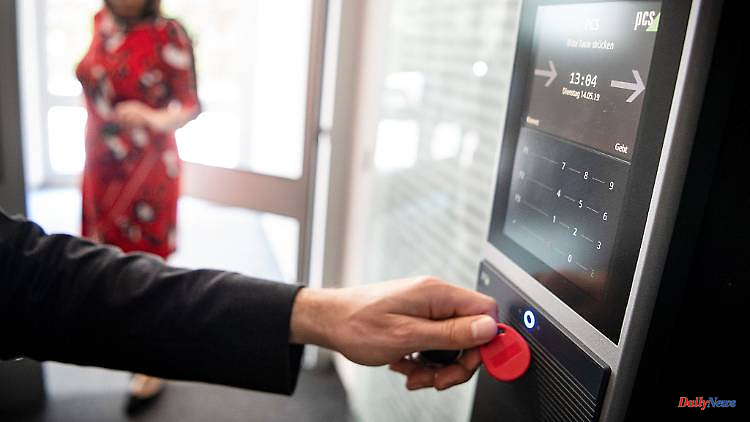The Federal Labor Court in Erfurt is dealing with the electronic recording of working hours. So far, works councils have been supposed to ensure that modern time clocks are not misused for monitoring purposes. Your role might change.
Many companies and authorities have them: trust-based working time models. Employees can organize their work themselves, their employer trusts them to use their working hours efficiently. Some employment lawyers now see the model, which benefits tens of thousands of employees, sales specialists or service technicians, as being at risk. The reason is a case from North Rhine-Westphalia, which is to be heard on Tuesday before the Federal Labor Court (BAG) in Erfurt.
What is it about?
The highest German labor judges are dealing with the question of whether works councils can demand the introduction of an electronic system for recording working hours. It is about the so-called right of initiative of employee representatives, which exists in many questions, but not in technical equipment that could also be used to monitor employees. Here, according to the Works Constitution Act, they have a right of co-determination, a quasi right of defense in the interests of their colleagues. As a rule, employers take the initiative to establish electronic time recording systems in companies, offices or administrations.
What does the plaintiff want?
Not so in the case of a social institution in North Rhine-Westphalia. Its works council has filed a complaint up to the third and last instance of the labor court in Erfurt because it wants the highest court to have determined "that he has a right of co-determination for the initiative introduction of electronic time recording" - in short, that he can demand a digital time clock. The works council is not concerned with monitoring, but with documenting employees' overtime. After all, they could also be interested in electronic time recording, "especially when it comes to the precise recording of working hours and overtime".
What makes the case explosive?
Following a ruling by the European Court of Justice (ECJ), the topic of recording working hours is currently being discussed a great deal in German business and administration. According to this, employers must enable the documentation of working hours - there are different legal opinions on how.
planned change in law
In addition, the traffic light coalition is examining an amendment to the Working Hours Act. The coalition agreement between the SPD, Greens and FDP states: "In dialogue with the social partners, we are examining what need for adjustment we see in view of the case law of the European Court of Justice on working time law. Flexible working time models (e.g. trust-based working hours) must continue to be possible."
Contradictory decisions of the lower courts
The labor court dismissed the works council's request, while the regional labor court in Hamm granted it the right to initiate an electronic time recording system. Now it's the turn of the federal labor judges - it's about whether they will confirm or change their previous case law.
What Labor Lawyers Say
"The question is: Can a works council demand that an employee's working hours be recorded electronically, even if the employer and perhaps also the employee do not want it at all?" says Gregor Thüsing, a professor of labor law in Bonn. The codetermination right was created "to limit surveillance, not to expand it. I'm looking forward to the decision." Control stands in the way of trust-based working time models. And there are other, proven ways of documenting overtime, says Thüsing. Specialist lawyer Michael Kalbfus from the law firm Noerr in Munich also sees “far-reaching consequences for working time models”.












